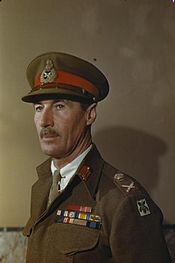Ronald Scobie
| Ronald MacKenzie Scobie | |
|---|---|
 |
|
| Born | 8 June 1893 Mandalay, British Burma |
| Died | 23 February 1969 (aged 75) Aldershot, Hampshire, England |
| Allegiance |
|
| Service/branch |
|
| Years of service | 1914–1946 |
| Rank | Lieutenant General |
| Unit | Royal Engineers |
| Commands held |
70th Infantry Division III Corps |
| Battles/wars |
World War I World War II Greek Civil War |
| Awards |
Knight Commander of the Order of the British Empire Companion of the Order of the Bath Military Cross |
Lieutenant General Sir Ronald MacKenzie Scobie KBE, CB, MC (8 June 1893 – 23 February 1969) was a senior British Army officer who fought in both World War I and World War II, where he commanded the 70th Infantry Division and later III Corps.
Educated at Cheltenham and Woolwich, Scobie played rugby for Scotland in 1914. He was commissioned into the Royal Engineers in 1914 and served during the First World War in France and Belgium 1914–1918; General Staff Officer Grade 3, France 1918; Bde Maj, France 1918–1920; Officer, Company of Gentlemen Cadets, Royal Marine Artillery, Woolwich 1920–1924; Staff Capt, Aldershot Command 1927–1929; Bde Maj, Aldershot Command 1929–1931 He became Director of Military Artillery at the Royal Military College, Australia in 1932 and Assistant Adjutant General at the War Office in 1938.
In 1939, at the start of the Second World War Scobie, a brigadier, was Deputy Director of Mobilisation at the War Office. After this he held the position Deputy Adjutant General at General Headquarters, Middle East Land Forces in 1940 before being given command of the 70th Infantry Division, which was sent into to relieve the Australian 9th Division in Tobruk. Scobie was in command of the Tobruk fortress from 22 October 1941 to 13 December 1941, when, as part of Operation Crusader, the 70th Infantry Division led the break-out from Tobruk. In 1942 he became General Officer Commanding the Troops in Malta and on 22 March 1943 Scobie was promoted to lieutenant general and made Chief of the General Staff at General Headquarters Middle East. From 11 December 1943 he was given command of III Corps which was sent to Greece to expel the Germans but ended up becoming involved in the Greek Civil War. He remained in command of British forces in Greece until 1946.
...
Wikipedia
